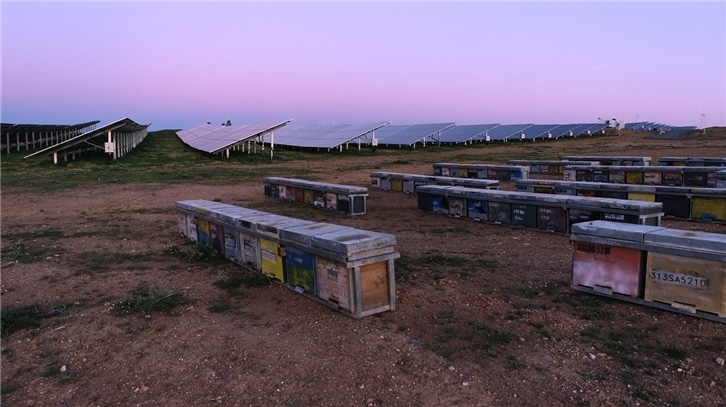From pv magazine Spain
Iberdrola has built an apiary at its Andévalo photovoltaic plant near Huelva, in Spain's Andalucia region, and another one at its Núñez de Balboa project in Usagre, near Badajoz in the country's Extremadura region.
The first solar park hosts 165 beehives and more than 8 million bees. The second set of 105 beehives host another 5 million bees.
The projects, which Iberdrola will continue to develop at its other PV plants in Spain, are designed to demonstrate how the location of pollinators in renewable facilities can improve the stability of ecosystems and enhance the yield of crops from surrounding agricultural land.
In solar parks, bees can live free of herbicides and agricultural chemicals, because the growth of herbs is controlled by grazing livestock. Such initiatives therefore create ecological zones that allow scientists to study how the cultivation of aromatic plants – eucalyptus, milflores, rosemary, broom and thyme – can improve the quality of honey, which will eventually be sold commercially.
Iberdrola inaugurated the Andévalo 50 MW solar plant in the municipality of Puebla de Guzmán (Huelva) in September. The electricity is exclusively used to produce Heineken beer in Spain under a power purchase agreement with the brewing giant.
The 500 MW, €300 million ($366.6 million) Núñez de Balboa project is located near the municipalities of Usagre, Hinojosa del Valle and Bienvenida. Iberdrola built the project in collaboration with Ecoenergías del Guadiana.
In November 2020, Endesa collaborated with the Carmona City Council on a pioneering initiative – a beekeeping project at its PV plants. The initiative includes the pilot cultivation of 3 hectares of aromatic plants.
This content is protected by copyright and may not be reused. If you want to cooperate with us and would like to reuse some of our content, please contact: editors@pv-magazine.com.



By submitting this form you agree to pv magazine using your data for the purposes of publishing your comment.
Your personal data will only be disclosed or otherwise transmitted to third parties for the purposes of spam filtering or if this is necessary for technical maintenance of the website. Any other transfer to third parties will not take place unless this is justified on the basis of applicable data protection regulations or if pv magazine is legally obliged to do so.
You may revoke this consent at any time with effect for the future, in which case your personal data will be deleted immediately. Otherwise, your data will be deleted if pv magazine has processed your request or the purpose of data storage is fulfilled.
Further information on data privacy can be found in our Data Protection Policy.